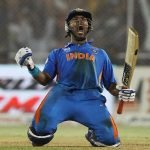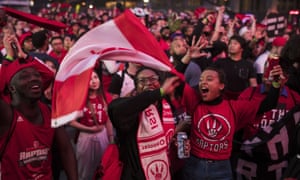
When Fitriya Hussein was given free tickets to a Toronto Raptorsbasketball game years ago in middle school, she was drawn in by the intensity of play; the strategy, speed and excitement. She instantly became a fan. But with that mantle came years of heartbreak, disappointment and frustration that sports fans around the world know all too well.
Now, after Friday’s victory over the reigning champion Golden State Warriors in the NBA finals, the Raptors are a single win away from their first-ever championship. And basketball fans in Toronto are experiencing a feeling that has been absent for more than two decades: hope.
Paired up against a powerful but injury-riddled Warriors team, the Raptors can make history when the best-of seven series, which they lead 3-1, returns to Toronto on Monday evening.
“It’s actually happening. It’s literally a dream come true. We’ve had to fight so hard for this,” says Hussein of the team’s hard-won place in the championships. “It’s mind blowing.”
Raptors fever is everywhere in Toronto. The raptor claw is on billboards, restaurant windows and inked into the skin of the most loyal fans. Even at a recent performance of the national ballet, the team’s slogan: ‘We the North’, was projected onto a black curtain.
Canada’s largest city is no stranger to major sports franchises. Its vaunted Maple Leafs were a dynastic ice hockey force in the 1960s. The Blue Jays won the baseball World Series in 1993. But Toronto hasn’t experienced the frenzied elation of a major sports championship in more than 20 years (Toronto FC won the MLS title in 2017, but soccer doesn’t quite have the pull of hockey, baseball and basketball in Canada); there is an excitement that has infected much of the city.
Part of the interest surrounding the team is a belief that basketball is the “sport of the future” for Canada, says Toronto-based photographer Neil Ta. A longtime Raptors fan – and season’s pass holder in recent years – he sees the sport not only captivating viewers, but reflecting the makeup of the city. “If you go to a [hockey game] the crowd is sort of very much one type of demographic. And when you go to a Raptors game, it’s much more reflective of the city – and of the country,” he says.
Toronto is one of the most diverse cities in the world, and basketball resonates at a much wider level than other sports, accessible to both longtime residents and new arrivals, says Ta.
“I grew up with hockey. But because we were immigrants and not too well off, it was a sport that I could never play…I couldn’t afford the equipment and league fees,” he says. “But with basketball, you know … pick up like a $5 rubber ball and you’re pretty much set.”
It hasn’t hurt the Raptors’ immense popularity – in Toronto at least – that their ‘global ambassador’ and de-facto mascot is Drake, the award-winning hip-hop artist who has made it his mission to elevate the status of Toronto. But another component of the Raptors’ success – and one which sports analysts have marvelled at since descending on Toronto as the finals began – are the city’s obsessive fans.
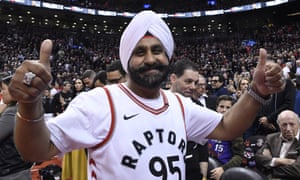
The beating heart of the team’s support lies in Jurassic Park, a cordoned-off space outside the Raptors’ home court, Scotiabank Arena. During the regular season, it is a lively space for the team’s most loyal supporters. But when the Raptors qualified for the finals, Jurassic Park became a site of pilgrimage. Fans began lining up as early as 14 hours before the game to stake out prime viewing spots, forcing city officials to create spillover areas.
“We’ve been through some tough times and some rough times,” says Kajan Thiruthanikasalam, a longtime fan who lined up hours before the first game of the NBA finals for a spot close to the giant screen. “But if this is reward we’re getting right now, so be it.”
For years, he and other fans watched with anticipation as the team approached the playoffs, only to wind up knocked out of contention early on. “We had a few years of what I’d call fools gold,” says Adon Moss, a longtime fan who now watches the games from his home in Newfoundland. “They looked like they’d break through. But it was never really ever going to happen.”
But the vagaries of professional sports mean teams change and adapt. Last summer, the Raptors acquired Kawhi Leonard, one of the best players in the league. “[Leonard] has made us believe in this team. He’s instilled a new life into this city,” says Thiruthanikasalam.
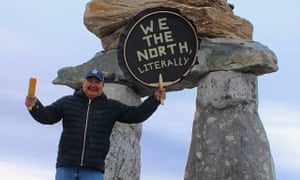
As the Raptors pursue the franchise’s first NBA championship, Jurassic Park has expanded well outside downtown Toronto. Movie theatres have offered free screenings of games, only to have tickets quickly sell out. Cities across the country have created public viewing spaces. The message is clear: the Raptors aren’t just a Toronto phenomenon; they’re becoming Canada’s team.
Even in the far north, committed fans are ecstatic at the prospect of an NBA championship. In the community of Rankin Inlet, 1,500 miles north-west of Toronto, artist Noah Tiktak has cheered on the team for years. “I was a [Chicago] Bulls fan when [Michael] Jordan played and then lost a bit of interest after he retired,” says Tiktak. “Then the Raptors came along – a team from Canada!” The run has been “exciting” says Tiktak, who recently made an Inuit drum with a Raptors logo on the front and the words “We the North, Literally” on the back.
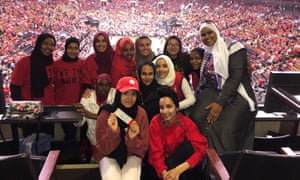
The Raptors’ success has also encouraged more young fans to play basketball, says Hussein. She works with Hijabi Ballers, an organization in the greater Toronto area that coaches young athletes and promotes sport for girls in the Muslim community.
Despite being Canada’s – and Toronto’s – team, only a single Raptor, Chris Boucher, is Canadian. For some, that only increases the appeal and captures what has made residents such fervent supporters: the team is a group of scrappy underdogs, overlooked by the rest of the league – much like the city itself. “You don’t need to be from here to represent this place,” says Ta. “Not everyone who lives here is from here. That’s really the story of Toronto.”
[“source=theguardian”]



